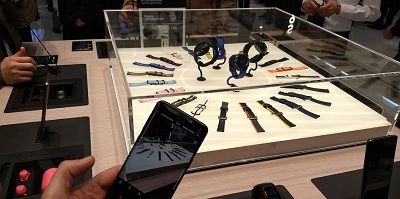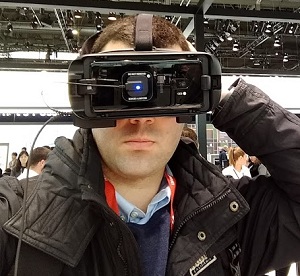Mobile World Congress: Life at infinite point zero
Virtual reality, 5G and artificial intelligence are among some of the services highlighted in the latest edition of the Mobile World Congress. “What do we contribute apart from the trace of our fingerprints?”, asks IT engineer Jesús Muñoz.
BARCELONA · 06 MARCH 2018 · 14:38 CET

The film Her portrays how the main character falls in love with his computer’s service wizard; a virtual intelligence that speaks to him and listens to him as if she really understood his feelings, his likes and dislikes.
The remote or even likely possibility that this ends up becoming a reality will be based upon the unstoppable development of technology and its effect on people’s lives. And, up until now, there are many indications that point to this strange futuristic path.
The Mobile World Congress held its 2018 edition last week in Barcelona. According to the event’s press service, undeterred by the €799 price tag of the cheapest admission, more than 107,000 people attended the exhibition grounds where 2,400 companies were exhibiting.
This event continues to pose a significant ethical burden. John Hoffman, the manager of GSMA, the company that organises said event, has already declared that in 2019 Barcelona will again host the congress.
“The Mobile World Congress is not just a technological congress; it is also a window for brands to sell and offer the best that they have. A window that moves lots and lots of money. With up to 17 different aims, it offers a wide program of sustainable development goals. One such program is ‘Consumption and Responsible Production’, whose aim I see them far from achieving in an industry that urges the consumer to consume”, expresses Jesús Muñoz, a senior IT engineer working in this sector for the last 10 years, also with a years’ experience in Silicon Valley, home to some of the most powerful technology multinationals.

Against the €471 million that the Mobile World Congress generated for the local economy, according to Hoffman, one also has to consider the other side of this industry. Conflicts and child exploitation often take place to obtain coltan (a mineral invaluable in the making of the majority of mobile phones and that is primarily extracted in the Democratic Republic of the Congo) along with extremely precarious working conditions in some of the places where they manufacture many devices today.
“This growth has many implications; one at a personal level of wanting to consume and always obtaining the newest devices. However, it also has implications for what it represents in the development of these devices in terms of material and cheap labour force. It is common knowledge that a lot of this technology is developed in countries where workers’ rights are non-existent and where businesses take advantage of their employees”, Muñoz points out.
Nonetheless, this duality of technological development is not solely expressed through, on the one hand massive congresses, and on the other the promotion of forced labour. It is also fully immersed in the moral dimension of the use that it is being given.
CAUGHT BETWEEN UTILITY AND DEPENDANCE
The connectivity of the 5G network, artificial intelligence and virtual reality are some of the services most highlighted in this edition of the congress, according to Muñoz, who attended the exhibition in which businesses showed off their latest and newest products. These are key players in the bidding for digital consumption.

On the other hand, Muñoz asks if the direction in which technology has taken imposes an increasing disconnection with one’s surroundings; the now typical image of a group of people sitting having a drink and looking down, each one moving their thumbs at high speed across touchscreens. “Consumption technology gives us the sense of the immediate, the here and now, and without having to move from the sofa. We make ourselves sheer consumers, but what do we contribute apart from the trace of a fingerprint that we leave behind? What of the effort of having to achieve something rather than it being obtained immediately?”.
Thus, further reflection is necessary on whether or not the benefits of this connectivity and digital convenience will end up becoming a damaging metaphor that passes unnoticed from our screens.
Published in: Evangelical Focus - science - Mobile World Congress: Life at infinite point zero
